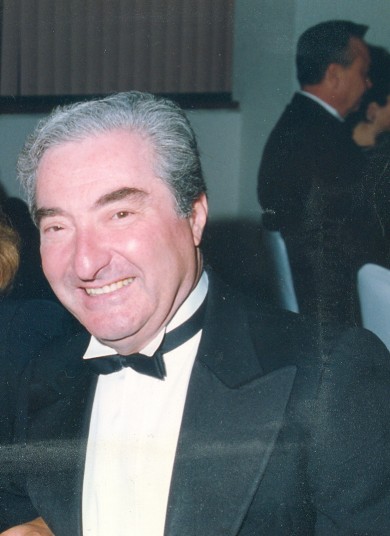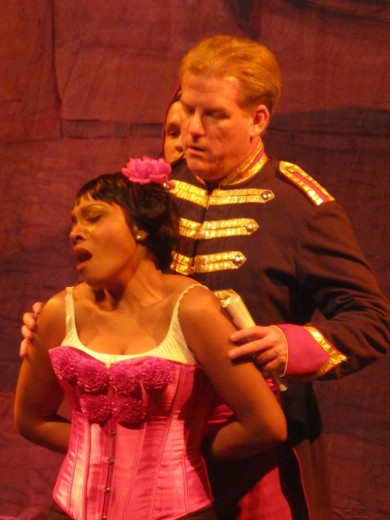With vibrant singing and rough edges, Miami Lyric Opera to mark its 10th anniversary with Puccini

Raffaele Cardone’s Miami Lyric Opera has been bringing affordable opera to local audiences for a decade.
Imagine an opera company that functions with the cold precision of a touring Broadway musical and you have imagined everything that Miami Lyric Opera is not.
At the low-budget company’s 2010 production of Puccini’s La Bohème, the orchestra played out of tune and the set looked like it had been delivered straight from a high school auditorium. Yet the superb singing and warm ensemble chemistry of its youthful cast made for an unforgettable performance.
At a sizzling production of Mascagni’s Cavalleria Rusticana, the tenor sang like Caruso while wearing a toupee that looked like a carefully shellacked opossum. During the first act of a murderously effective production of Verdi’s Rigoletto, the translations projected above the stage experienced a freakout and suddenly started flashing these words: “Lenovo 1 month free – Tech support experts standing by.”
Despite technical glitches and a microscopic budget, Miami Lyric Opera, which celebrates its 10th anniversary this season, attracts flocks of true opera lovers. The company, which will perform Puccini’s rarely heard short operas Il Tabarro and Gianni Schicchi July 13 and 14 at the Colony Theater in Miami Beach, puts on opera as it might have been done in a regional Italian town at the time of Rossini: modest sets, barely adequate work by the orchestra and chorus, but with singing—the essence of opera— that is always respectable and often excellent.
“I personally find going to Miami Lyric more exciting than going to Florida Grand Opera,” said Jeff Haller, a donor and opera lover who says the Cavalleria and Bohème performances were the best he’d ever heard. “It’s not about the big Broadway show opera. I hate that kind of stuff. If you have lots of money, you can do anything you want. At the same time, too, we’ve seen some pretty terrible things [at MLO] too, right?
“But for those of us who go a lot, disasters are kind of useful. They give you a measuring stick. They don’t have any money, but they have such passion and belief in what they were doing. It just feels so authentic, like the real thing.”
Presiding over it all is the company’s founder and artistic director Raffaele Cardone, whose informal manner, shock of white hair and thick Italian accent give a touch of Old World warmth to the performances at the company’s two venues, the Colony Theater and the Olympia Theater in downtown Miami.
Born on the Adriatic Sea in the southern Italian city of Bari, Cardone fell in love with opera as a child, took years of singing lessons and joined a traveling opera troupe at 19. He sang for years at the opera houses of Italy and South America. He came to South Florida with his wife for treatment for a heart condition and became a voice teacher.
He founded Miami Lyric Opera in 2004, beginning with a concert of arias and shortly after that putting on the company’s first staged opera, Verdi’s La Traviata.
Cardone was not trying to compete with the glossier goings-on at Florida Grand Opera or Palm Beach Opera. He wanted to give young singers the opportunity to take on the starring roles they wouldn’t get at the big houses. He wanted to present operas that are rarely, if ever, staged in South Florida. And, most importantly, he wanted to provide audiences with an affordable and inviting opportunity to experience opera, more like the everyday, popular art form he remembered in Italy.
“The mission is to offer opportunities to new talent, to bring the opera to people in a more friendly atmosphere so people don’t get scared to go, and looking to improve year after year,” he said. “Many of my students and the people coming up from universities, my question was where are they going to go? They cannot jump immediately to a major opera house so they have to learn, becoming artists, becoming singers. With this in mind, I said let’s put together an opera company.”
Cardone pays a fraction of what top performers earn at Florida Grand Opera or Palm Beach Opera. But with a canny ear for talent and knowledge of the vocal scene, he is able to find surprisingly high-quality singers. Of all the elements of a Miami Lyric Opera production – set, direction, orchestra, or chorus—-it’s the singing that really distinguishes itself, and singers who start at Miami Lyric often go on to bigger houses.
The baritone Nelson Martinez, for example, has long been one of the company’s most effective and reliable performers, having starred in Rigoletto, The Barber of Seville, Lucia di Lammermoor, Tosca and La Traviata. This season, he will make his debut with Florida Grand Opera, singing the role of Jed in Marvin David Levy’s Mourning Becomes Electra and the title role in Verdi’s Nabucco.
The tenor Mario Chang, who received acclaim for his MLO performance in Mascagni’s L’Amico Fritz, has since entered the Metropolitan Opera’s prestigious Lindemann Young Artist Development Program. When Chang appeared on the Met stage last season in a small role in Wagner’s Parsifal, Cardone announced the news proudly from the stage. The bass-baritone Stefano de Peppo, who performed in MLO’s productions of The Barber of Seville and Don Pasquale, has gone on to sing with the Washington National Opera, Palm Beach Opera and Los Angeles Opera.
“More than forty singers made their debut in principal roles with us and now are continuing their successful career in most of the cases,” Cardone said. “I believe that makes me very proud.”

Erica Papillion-Posey and James Charles Taylor in Miami Lyric Opera’s “Carmen,” presented in March. Photo: Daniel Fernandez
Cardone’s company performs operas as written. He has no interest in the contemporary fashion of allowing the stage director to impose a radical vision on the opera by presenting a Mozart opera with characters in leather jackets and sunglasses, or setting Tannhäuser in Nazi Germany.
“He’s concerned with people really respecting the works,” said the tenor David Pereira, a Miami Lyric regular who will sing the role of Rinuccio in Gianni Schicchi. “It’s a real labor of love. He’s Italian. Some people don’t have the same respect for these works as he does. To him, they’re sacred.”
Cardone generally sticks to the mainstream Italian repertoire, although he often stages some less frequently heard operas.
Among the operas scheduled through 2014 are several rarely performed works, including Donizetti’s La Favorita, as well as the return of two unusual works previously staged by the company, Mascagni’s L’Amico Fritz and Emilio Arrieta’s Spanish-language opera Marina.
The operas to be performed this month are part of a set of three short operas by Puccini called Il Triticco that were given their world premiere at the Metropolitan Opera just one month after the end of World War I. Il Tabarro is a tragedy, with the standard operatic brew of love, betrayal and death, executed in a remarkably compact and dramatic manner. Gianni Schicchi is a comedy with the lightest score Puccini ever produced. Between them they have one famous aria, O mio babbino caro from Schicchi, and they are performed so infrequently that many veteran operagoers only know them from recordings.
The company has a tiny budget for an art form that requires so many musicians, last year spending $259,375, and running a deficit. The low budget takes a toll, forcing the company to forego the intensive rehearsal schedule that’s necessary to bring off works that have so many moving parts.
“We don’t have enough rehearsals with the orchestra,” said the baritone Nelson Martinez. “We just have like two rehearsals. One with the orchestra and one dress rehearsal. That’s very tough for opera. Sometimes the first performance that we do is like another rehearsal.”
Beverly Coulter, professor of music at Barry University, who has performed both as a soprano and as conductor with Miami Lyric Opera, said Cardone’s vast knowledge, particularly of the Italian tradition, gives the company’s performances a sincerity and authenticity that go a long way toward compensating for any unevenness in execution.
“He was a phenomenal singer. He still will frequently burst forth in our rehearsals,” she said. “The love of opera shines through.
“He does really feel that no matter what, if you have a good singer on the stage, you have a show.”
No one knows the company’s shortcomings better than Cardone. He would love to have more money to hire musicians and hold additional rehearsals. He said he still needs more donations, volunteers and in-kind gifts to make the company live up to his own ideals of what it should be.
“The reason of my life is opera,” he said. “And because of the great respect I have for the opera, I know what I have to do better.”
Miami Lyric Opera presents Puccini’s Il Tabarro and Gianni Schicchi July 13 and 14 at the Colony Theater in Miami Beach. miamilyricopera.org
Posted in Articles
Leave a Comment
Tue Jul 2, 2013
at 11:35 am
No Comments






